新概念英语第三册Lesson 14 A noble gangster课件(共32张PPT)
文档属性
| 名称 | 新概念英语第三册Lesson 14 A noble gangster课件(共32张PPT) | 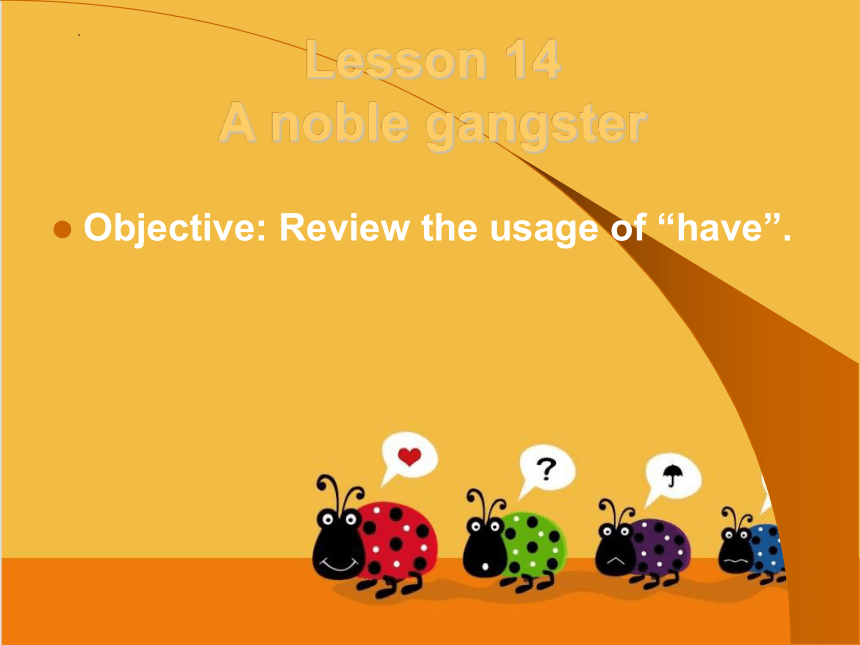 | |
| 格式 | pptx | ||
| 文件大小 | 322.2KB | ||
| 资源类型 | 教案 | ||
| 版本资源 | 新概念英语 | ||
| 科目 | 英语 | ||
| 更新时间 | 2024-02-19 14:57:22 | ||
图片预览

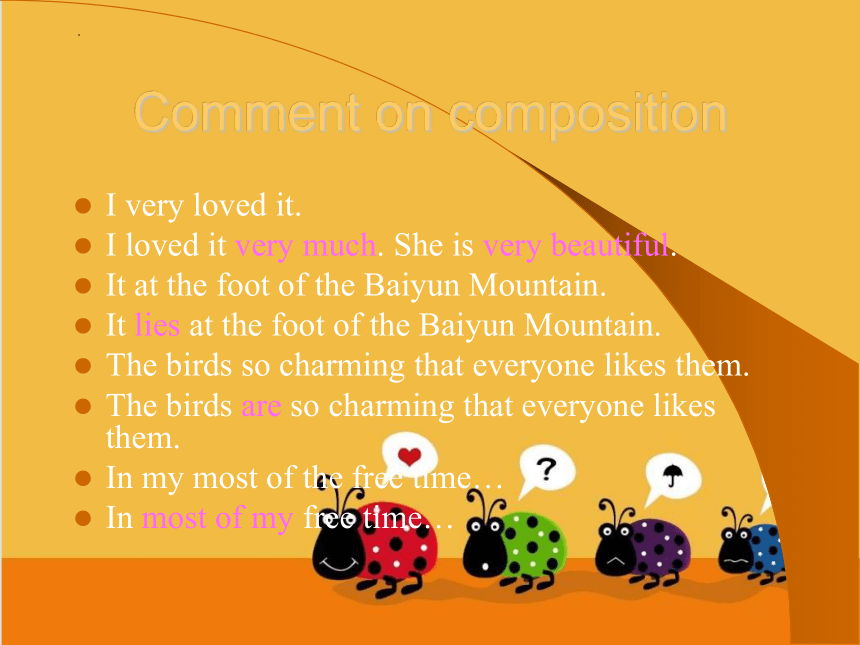
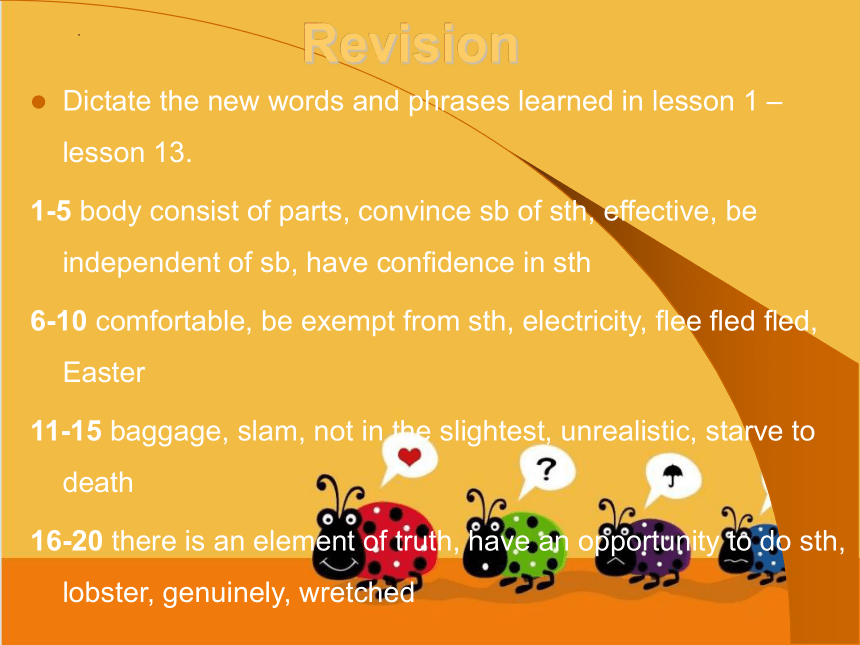
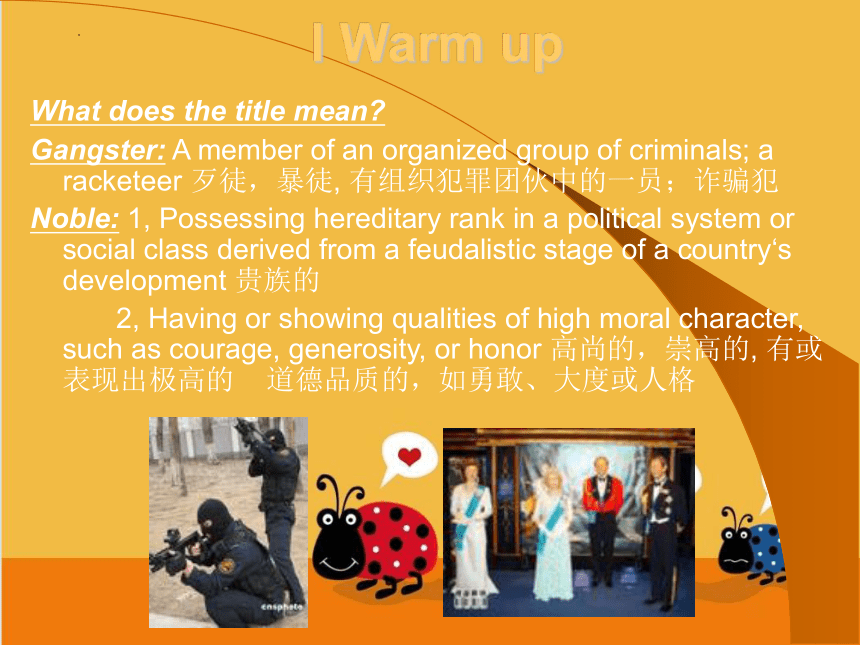
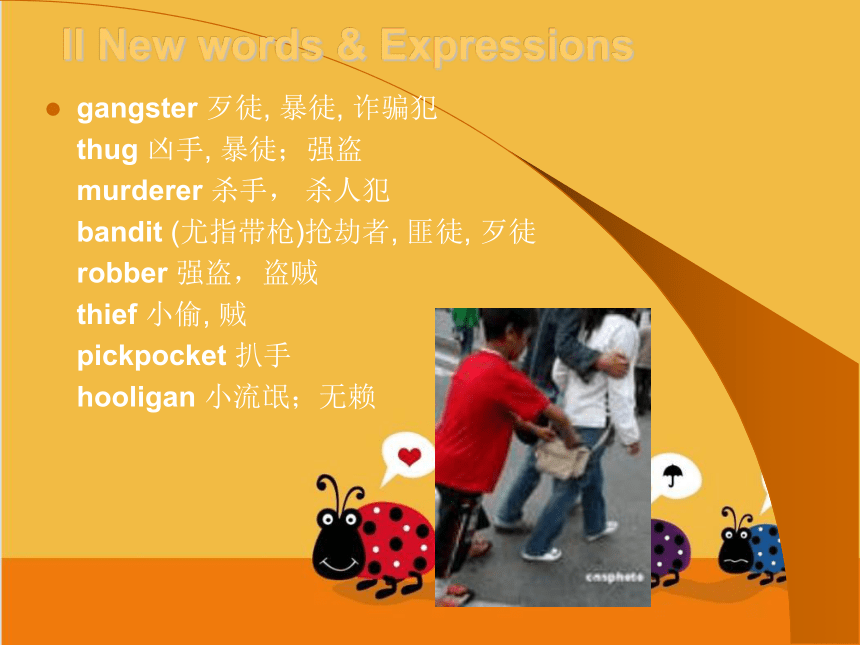
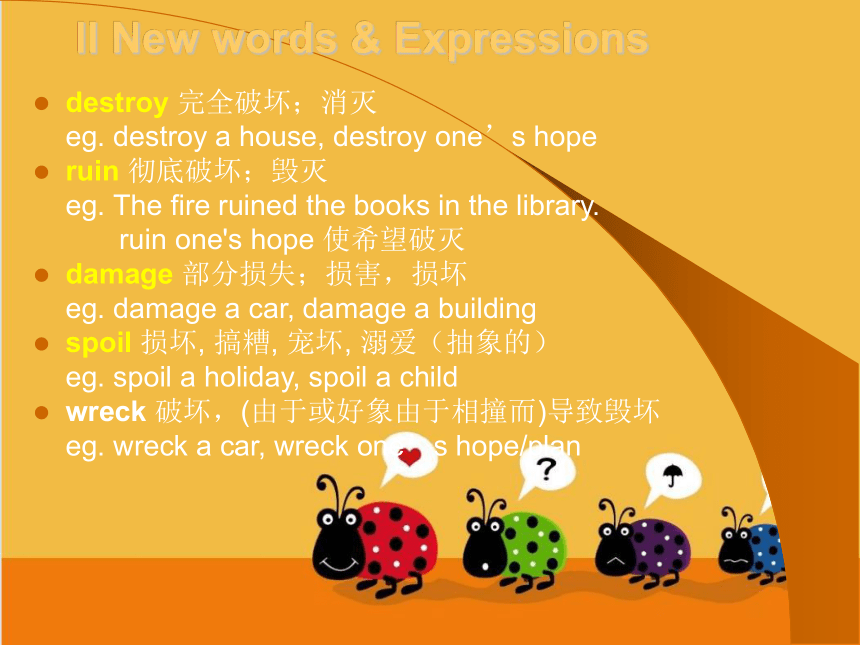

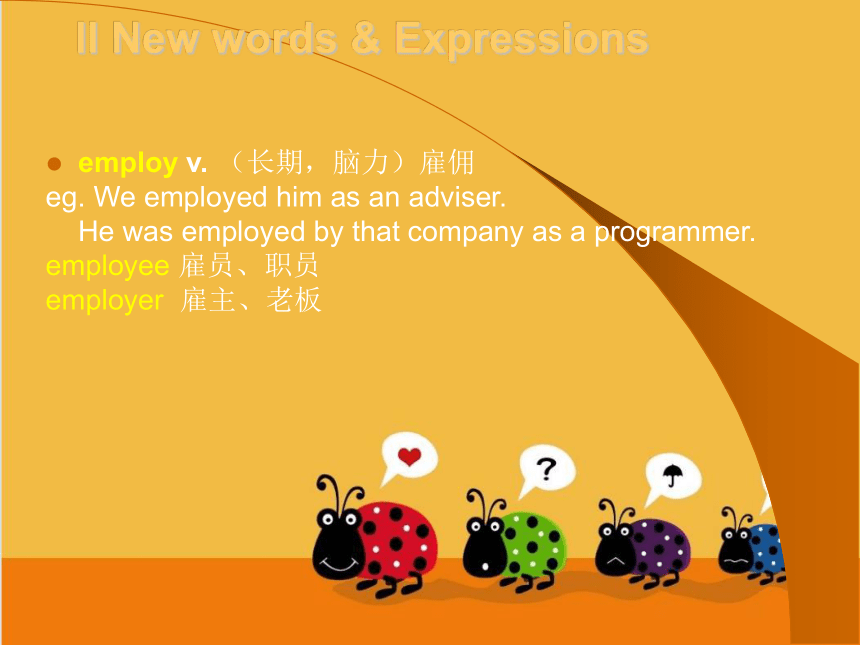
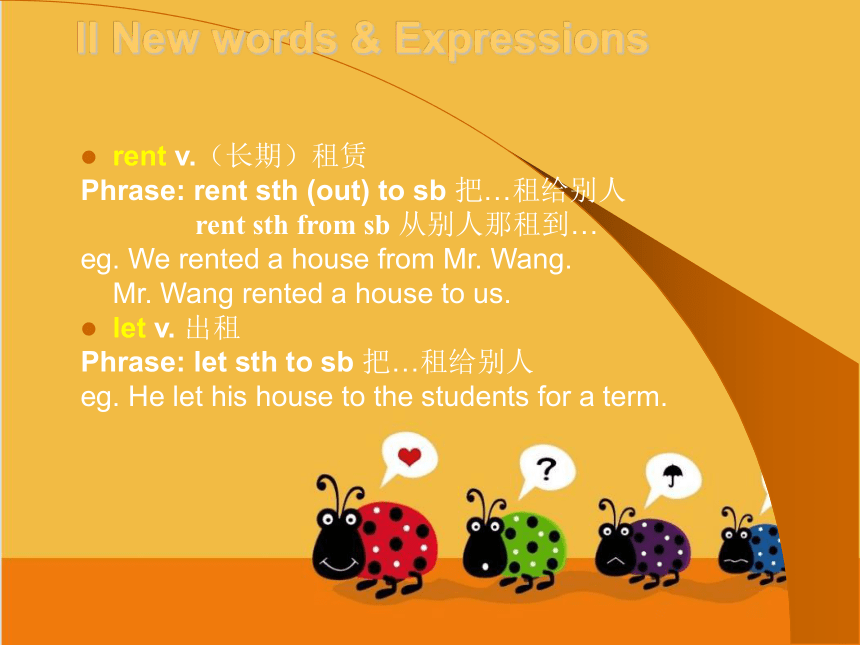
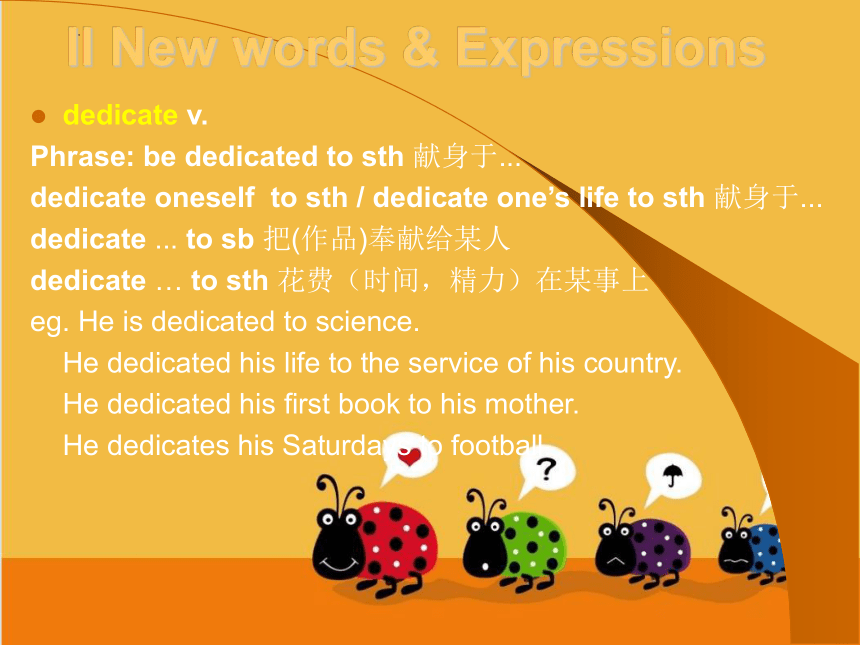
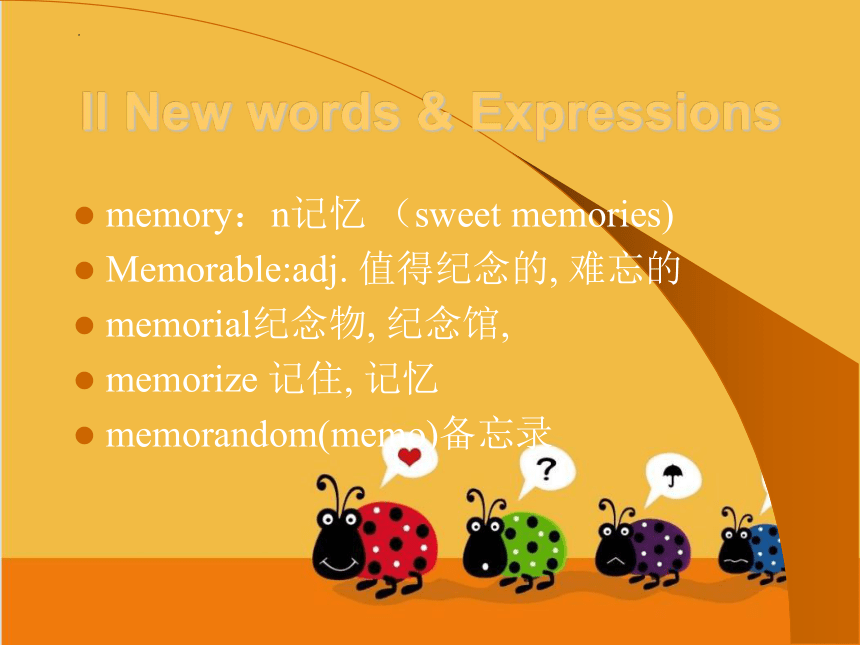
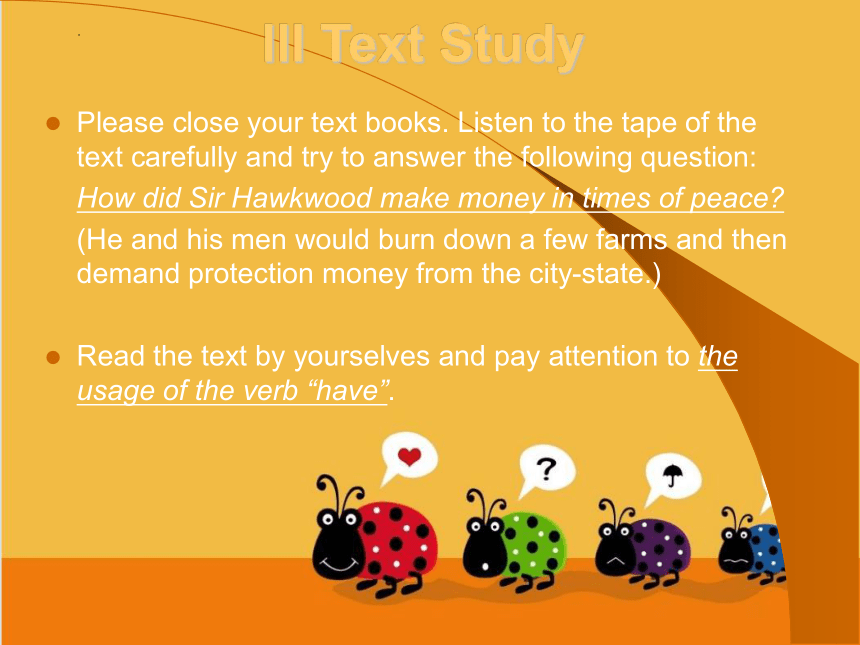
文档简介
(共32张PPT)
Lesson 14
A noble gangster
Objective: Review the usage of “have”.
Comment on composition
I very loved it.
I loved it very much. She is very beautiful.
It at the foot of the Baiyun Mountain.
It lies at the foot of the Baiyun Mountain.
The birds so charming that everyone likes them.
The birds are so charming that everyone likes them.
In my most of the free time…
In most of my free time…
Revision
Dictate the new words and phrases learned in lesson 1 – lesson 13.
1-5 body consist of parts, convince sb of sth, effective, be independent of sb, have confidence in sth
6-10 comfortable, be exempt from sth, electricity, flee fled fled, Easter
11-15 baggage, slam, not in the slightest, unrealistic, starve to death
16-20 there is an element of truth, have an opportunity to do sth, lobster, genuinely, wretched
I Warm up
What does the title mean
Gangster: A member of an organized group of criminals; a racketeer 歹徒,暴徒, 有组织犯罪团伙中的一员;诈骗犯
Noble: 1, Possessing hereditary rank in a political system or social class derived from a feudalistic stage of a country‘s development 贵族的
2, Having or showing qualities of high moral character, such as courage, generosity, or honor 高尚的,崇高的, 有或表现出极高的 道德品质的,如勇敢、大度或人格
II New words & Expressions
gangster 歹徒, 暴徒, 诈骗犯
thug 凶手, 暴徒;强盗
murderer 杀手, 杀人犯
bandit (尤指带枪)抢劫者, 匪徒, 歹徒
robber 强盗,盗贼
thief 小偷, 贼
pickpocket 扒手
hooligan 小流氓;无赖
II New words & Expressions
destroy 完全破坏;消灭
eg. destroy a house, destroy one’s hope
ruin 彻底破坏;毁灭
eg. The fire ruined the books in the library.
ruin one's hope 使希望破灭
damage 部分损失;损害,损坏
eg. damage a car, damage a building
spoil 损坏, 搞糟, 宠坏, 溺爱(抽象的)
eg. spoil a holiday, spoil a child
wreck 破坏,(由于或好象由于相撞而)导致毁坏
eg. wreck a car, wreck one’s hope/plan
II New words & Expressions
hire vi. (1)(短期,体力)雇佣
(2) (暂时)租赁
Phrase: hire sth (out) to sb 把…租给别人
hire sth from sb 从别人那租到…
eg. We hired an advertising company to help us sell our new software.
He hired a car for two days.
"Why don't you hire out your spare room to other people, and earn some money
You may hire a suit from the shop for your wedding.
II New words & Expressions
employ v. (长期,脑力)雇佣
eg. We employed him as an adviser.
He was employed by that company as a programmer.
employee 雇员、职员
employer 雇主、老板
II New words & Expressions
rent v.(长期)租赁
Phrase: rent sth (out) to sb 把…租给别人
rent sth from sb 从别人那租到…
eg. We rented a house from Mr. Wang.
Mr. Wang rented a house to us.
let v. 出租
Phrase: let sth to sb 把…租给别人
eg. He let his house to the students for a term.
II New words & Expressions
dedicate v.
Phrase: be dedicated to sth 献身于...
dedicate oneself to sth / dedicate one’s life to sth 献身于...
dedicate ... to sb 把(作品)奉献给某人
dedicate … to sth 花费(时间,精力)在某事上
eg. He is dedicated to science.
He dedicated his life to the service of his country.
He dedicated his first book to his mother.
He dedicates his Saturdays to football.
II New words & Expressions
memory:n记忆 (sweet memories)
Memorable:adj. 值得纪念的, 难忘的
memorial纪念物, 纪念馆,
memorize 记住, 记忆
memorandom(memo)备忘录
III Text Study
Please close your text books. Listen to the tape of the text carefully and try to answer the following question:
How did Sir Hawkwood make money in times of peace
(He and his men would burn down a few farms and then demand protection money from the city-state.)
Read the text by yourselves and pay attention to the usage of the verb “have”.
III Text Study
Explain the text:
There was a time when the owners of shops and businesses in Chicago had to pay large sums of money to gangsters in return for “protection”.
(1) Structure: “when” introduces an attributive clause to modify “a time”. “when”引导定语从句修饰“a time”。
(2) Phrases: have to do: objective necessity 客观必要性
in return (for…): as a repayment (for), in exchange (for)
作为(...的)报答
eg. I wish I could do something in return for his kindness to me.
I gave him a Christmas present but he gave me nothing in return.
I teach him English in return for the Japanese lessons he gives me.
III Text Study
Explain the text:
If the money was not paid promptly, the gangsters would quickly put a man out of business by destroying his shop.
(1) Structure: “If” introduces a conditional clause. “If”引导条件状语从句。
(2) Phrase: put sb out of business 使...破产
put sth/sb + adv./prep. + n.: place in a certain position or situation 使…处于某种位置或状态下
eg. Put the matter out of your mind.
You’ve put me out of patience.
You’ve put me in a bad temper.
The police have put the man in prison.
III Text Study
Explain the text:
As long ago as the fourteenth century, an Englishman, Sir John Hawkwood, made the remarkable discovery that people would rather pay large sums of money than have their life work destroyed by gangsters. .
(1) Structure: “that” introduces an appositive clause to modify “the remarkable discovery”
(2) Phrases: as long ago as: as early as
as + adv. / adj. + as: used for emphasis, usually used in written English 用来表强调,常见于书面语中
eg. I saw him as recently as yesterday.
He’ ll come back as late as next month.
The teacher came to school as early as 7:00.
III Text Study
Explain the text:
As long ago as the fourteenth century, an Englishman, Sir John Hawkwood, made the remarkable discovery that people would rather pay large sums of money than have their life work destroyed by gangsters.
(2) Phrases: would rather do than do
eg. I’d rather go with you than stay here.
I’d rather do my homework now than put it until tomorrow.
have sth done 使…被做
eg. I had my finger cut when I was cooking yesterday.
He had his car crashed into the wall.
III Text Study
Explain the text:
He soon made a name for himself and came to be known to the Italians as Giovanni Acuto.
Phrases:
make a name for oneself / make one’s name 出名,成名
eg. He made a name for himself as a concert pianist.
他以交响乐钢琴演奏家成名。
She first made her name as an actress.
她当初是以演员而出名的。
be known to sb (as…) (以…)为...所熟知
eg. Zhou Xingchi is known to the audience as “a farce star”.
He is known to the police as a pickpocket.
III Text Study
Explain the text:
Whenever the Italian city-states were at war with each other, Hawkwood used to hire his soldiers to princes who were willing to pay the high price he demanded.
(1) Structure: “whenever” introduces an adverbial clause of concession; the main clause consists of an attributive clause introduced by “who” to modify “princes”; then in the attributive clause “(that) he demanded” is another attributive clause to modify “the high prices”.
“whenever”引导让步状语从句;主句中出现了一个由“who”引导的定语从句来修饰“princes”;定语从句中又出现了一个定语从句“(that) he demanded”来修饰“the high prices”。
III Text Study
Explain the text:
In times of peace, when business was bad, Hawkwood and his men would march into a city-state and, after burning down a few farms, would offer to go away if protection money was paid to them.
(1) Paraphrase: In times of peace, when business was bad, Hawkwood and his men would march into a city-state and after they had burnt down a few farms, they would offer to go away if protection money was paid to them.
III Text Study
Explain the text:
In times of peace, when business was bad, Hawkwood and his men would march into a city-state and, after burning down a few farms, would offer to go away if protection money was paid to them.
(2) Structure: “when” introduces an adverbial clause of time; the main clause is made of a compound statement connected by “and”; then in the second clause of the compound statement "if” introduces an adverbial clause of condition. “after burning down a few farms” is a “prep. + gerund” phrase used as adverbial of time.
“when”引导时间状语从句;主句是一个由“and”连接的并列句,并列句的第二个分句内又出现了由“If”引导的条件状语从句。“after burning down a few farms” 是一个“介词+ 动名词”组成的短语做时间状语。
III Text Study
Explain the text:
When he died at the age of eighty, the Florentines gave him a state funeral and had a picture painted which was dedicated to the memory of “the most valiant soldier and most notable leader, Signor Giovanni Haukodue”.
(1) Structure: “when” introduces an adverbial clause of time; the main clause is made of a compound statement connected by “and”; then in the second clause of the compound statement “which” introduces an attributive clause to modify “a picture”.
“when”引导时间状语从句;主句是一个由“and”连接的并列句,并列句的第二个分句内又出现了由“which”引导的定语从句修饰“a time”。
III Text Study
Explain the text:
When he died at the age of eighty, the Florentines gave him a state funeral and had a picture painted which was dedicated to the memory of “the most valiant soldier and most notable leader, Signor Giovanni Haukodue”.
(2) Phrases: have sth done: ask the professional to do sth 请专业人员做…(compare with II 3(4))
eg. My hair is long. I’ll have it cut tomorrow.
to the memory of: 为了纪念,以纪念
eg. He founded the school to the memory of his late wife.
The monument was built to the memory of the heroes died in the revolution.
III Text Study
What does the title mean
Gangster: A member of an organized group of criminals; a racketeer 歹徒,暴徒, 有组织犯罪团伙中的一员;诈骗犯
Noble: 1, Possessing hereditary rank in a political system or social class derived from a feudalistic stage of a country‘s development 贵族的
2, Having or showing qualities of high moral character, such as courage, generosity, or honor 高尚的,崇高的, 有或表现出极高的道德品质的,如勇敢、大度或人格
IV Drills & Exercises
Read the text after the tape. Pay attention to the stress and intonation and where to stop.
Try to ask each other the comprehension questions in pairs without looking at the text.
(P67 Summary writing)
Key to Vocabulary
sums: amounts
promptly: immediately, timely, without delay
obtaining: getting, acquiring
remarkable: notable, unusual
settled: established, resided, went to live
hire: rent, let
demanded: required, asked for
Key Structures
Read the following passage and tell the usage of “have”:
Fish and chips has always been a favourite dish in Britain, but as the oceans have been over-fished, fish has become more and more expensive. So it comes as a surprise to learn that giant fish are terrifying the divers on North Sea oil rigs. Oil rigs have to be repaired frequently and divers, who often have to work in darkness a hundred feet under water, have been frightened out of their special cages made to protect them from these monsters. The fish are not sharks or killer whales, but favourite eating varieties like cod and skate which grow to unnatural sizes, sometimes as much as twelve feet in length. Three factors have caused these fish to grow so large: the warm water round the hot oil pipes under the sea; the plentiful supply of food thrown overboard by the crews on the rigs; the total absence of fishing boats around the oil rigs. As a result, the fish just eat and grow and grow in the lovely warm water. Who eats who
Key to Key Structures B
1, You’d better go to the smoking room when you want to have a smoke.
2, I have got a headache.
3, I’ll have my computer repaired.
Key to Special Difficulties
1, go
2, left / had left
3, did not speak / had not spoken
4, not speak
5, settled / had settled
6, did not tell / had not told
Key to multiple choice questions
b, b, a, a, c, b
a, c, b, d, d, c
Topic for discussion
“Do you admire Sir John Hawkwood Why or why not
“Do you agree with the saying ‘might is right’ Why or why not ”
Form into groups of 2-4 and discuss on one of the above topics. Time limit: 10 minutes
Invite volunteers to give their opinion before the class.
V Assignments
Read the new words and the text fluently. To be questioned next lecture time.
Finish exercises on your text book. Check together next lecture time.
Prepare for lesson 15. Go through new words and expressions and look for the usage of “appreciate”; read the text of lesson 15 for three times.
Thanks!
Lesson 14
A noble gangster
Objective: Review the usage of “have”.
Comment on composition
I very loved it.
I loved it very much. She is very beautiful.
It at the foot of the Baiyun Mountain.
It lies at the foot of the Baiyun Mountain.
The birds so charming that everyone likes them.
The birds are so charming that everyone likes them.
In my most of the free time…
In most of my free time…
Revision
Dictate the new words and phrases learned in lesson 1 – lesson 13.
1-5 body consist of parts, convince sb of sth, effective, be independent of sb, have confidence in sth
6-10 comfortable, be exempt from sth, electricity, flee fled fled, Easter
11-15 baggage, slam, not in the slightest, unrealistic, starve to death
16-20 there is an element of truth, have an opportunity to do sth, lobster, genuinely, wretched
I Warm up
What does the title mean
Gangster: A member of an organized group of criminals; a racketeer 歹徒,暴徒, 有组织犯罪团伙中的一员;诈骗犯
Noble: 1, Possessing hereditary rank in a political system or social class derived from a feudalistic stage of a country‘s development 贵族的
2, Having or showing qualities of high moral character, such as courage, generosity, or honor 高尚的,崇高的, 有或表现出极高的 道德品质的,如勇敢、大度或人格
II New words & Expressions
gangster 歹徒, 暴徒, 诈骗犯
thug 凶手, 暴徒;强盗
murderer 杀手, 杀人犯
bandit (尤指带枪)抢劫者, 匪徒, 歹徒
robber 强盗,盗贼
thief 小偷, 贼
pickpocket 扒手
hooligan 小流氓;无赖
II New words & Expressions
destroy 完全破坏;消灭
eg. destroy a house, destroy one’s hope
ruin 彻底破坏;毁灭
eg. The fire ruined the books in the library.
ruin one's hope 使希望破灭
damage 部分损失;损害,损坏
eg. damage a car, damage a building
spoil 损坏, 搞糟, 宠坏, 溺爱(抽象的)
eg. spoil a holiday, spoil a child
wreck 破坏,(由于或好象由于相撞而)导致毁坏
eg. wreck a car, wreck one’s hope/plan
II New words & Expressions
hire vi. (1)(短期,体力)雇佣
(2) (暂时)租赁
Phrase: hire sth (out) to sb 把…租给别人
hire sth from sb 从别人那租到…
eg. We hired an advertising company to help us sell our new software.
He hired a car for two days.
"Why don't you hire out your spare room to other people, and earn some money
You may hire a suit from the shop for your wedding.
II New words & Expressions
employ v. (长期,脑力)雇佣
eg. We employed him as an adviser.
He was employed by that company as a programmer.
employee 雇员、职员
employer 雇主、老板
II New words & Expressions
rent v.(长期)租赁
Phrase: rent sth (out) to sb 把…租给别人
rent sth from sb 从别人那租到…
eg. We rented a house from Mr. Wang.
Mr. Wang rented a house to us.
let v. 出租
Phrase: let sth to sb 把…租给别人
eg. He let his house to the students for a term.
II New words & Expressions
dedicate v.
Phrase: be dedicated to sth 献身于...
dedicate oneself to sth / dedicate one’s life to sth 献身于...
dedicate ... to sb 把(作品)奉献给某人
dedicate … to sth 花费(时间,精力)在某事上
eg. He is dedicated to science.
He dedicated his life to the service of his country.
He dedicated his first book to his mother.
He dedicates his Saturdays to football.
II New words & Expressions
memory:n记忆 (sweet memories)
Memorable:adj. 值得纪念的, 难忘的
memorial纪念物, 纪念馆,
memorize 记住, 记忆
memorandom(memo)备忘录
III Text Study
Please close your text books. Listen to the tape of the text carefully and try to answer the following question:
How did Sir Hawkwood make money in times of peace
(He and his men would burn down a few farms and then demand protection money from the city-state.)
Read the text by yourselves and pay attention to the usage of the verb “have”.
III Text Study
Explain the text:
There was a time when the owners of shops and businesses in Chicago had to pay large sums of money to gangsters in return for “protection”.
(1) Structure: “when” introduces an attributive clause to modify “a time”. “when”引导定语从句修饰“a time”。
(2) Phrases: have to do: objective necessity 客观必要性
in return (for…): as a repayment (for), in exchange (for)
作为(...的)报答
eg. I wish I could do something in return for his kindness to me.
I gave him a Christmas present but he gave me nothing in return.
I teach him English in return for the Japanese lessons he gives me.
III Text Study
Explain the text:
If the money was not paid promptly, the gangsters would quickly put a man out of business by destroying his shop.
(1) Structure: “If” introduces a conditional clause. “If”引导条件状语从句。
(2) Phrase: put sb out of business 使...破产
put sth/sb + adv./prep. + n.: place in a certain position or situation 使…处于某种位置或状态下
eg. Put the matter out of your mind.
You’ve put me out of patience.
You’ve put me in a bad temper.
The police have put the man in prison.
III Text Study
Explain the text:
As long ago as the fourteenth century, an Englishman, Sir John Hawkwood, made the remarkable discovery that people would rather pay large sums of money than have their life work destroyed by gangsters. .
(1) Structure: “that” introduces an appositive clause to modify “the remarkable discovery”
(2) Phrases: as long ago as: as early as
as + adv. / adj. + as: used for emphasis, usually used in written English 用来表强调,常见于书面语中
eg. I saw him as recently as yesterday.
He’ ll come back as late as next month.
The teacher came to school as early as 7:00.
III Text Study
Explain the text:
As long ago as the fourteenth century, an Englishman, Sir John Hawkwood, made the remarkable discovery that people would rather pay large sums of money than have their life work destroyed by gangsters.
(2) Phrases: would rather do than do
eg. I’d rather go with you than stay here.
I’d rather do my homework now than put it until tomorrow.
have sth done 使…被做
eg. I had my finger cut when I was cooking yesterday.
He had his car crashed into the wall.
III Text Study
Explain the text:
He soon made a name for himself and came to be known to the Italians as Giovanni Acuto.
Phrases:
make a name for oneself / make one’s name 出名,成名
eg. He made a name for himself as a concert pianist.
他以交响乐钢琴演奏家成名。
She first made her name as an actress.
她当初是以演员而出名的。
be known to sb (as…) (以…)为...所熟知
eg. Zhou Xingchi is known to the audience as “a farce star”.
He is known to the police as a pickpocket.
III Text Study
Explain the text:
Whenever the Italian city-states were at war with each other, Hawkwood used to hire his soldiers to princes who were willing to pay the high price he demanded.
(1) Structure: “whenever” introduces an adverbial clause of concession; the main clause consists of an attributive clause introduced by “who” to modify “princes”; then in the attributive clause “(that) he demanded” is another attributive clause to modify “the high prices”.
“whenever”引导让步状语从句;主句中出现了一个由“who”引导的定语从句来修饰“princes”;定语从句中又出现了一个定语从句“(that) he demanded”来修饰“the high prices”。
III Text Study
Explain the text:
In times of peace, when business was bad, Hawkwood and his men would march into a city-state and, after burning down a few farms, would offer to go away if protection money was paid to them.
(1) Paraphrase: In times of peace, when business was bad, Hawkwood and his men would march into a city-state and after they had burnt down a few farms, they would offer to go away if protection money was paid to them.
III Text Study
Explain the text:
In times of peace, when business was bad, Hawkwood and his men would march into a city-state and, after burning down a few farms, would offer to go away if protection money was paid to them.
(2) Structure: “when” introduces an adverbial clause of time; the main clause is made of a compound statement connected by “and”; then in the second clause of the compound statement "if” introduces an adverbial clause of condition. “after burning down a few farms” is a “prep. + gerund” phrase used as adverbial of time.
“when”引导时间状语从句;主句是一个由“and”连接的并列句,并列句的第二个分句内又出现了由“If”引导的条件状语从句。“after burning down a few farms” 是一个“介词+ 动名词”组成的短语做时间状语。
III Text Study
Explain the text:
When he died at the age of eighty, the Florentines gave him a state funeral and had a picture painted which was dedicated to the memory of “the most valiant soldier and most notable leader, Signor Giovanni Haukodue”.
(1) Structure: “when” introduces an adverbial clause of time; the main clause is made of a compound statement connected by “and”; then in the second clause of the compound statement “which” introduces an attributive clause to modify “a picture”.
“when”引导时间状语从句;主句是一个由“and”连接的并列句,并列句的第二个分句内又出现了由“which”引导的定语从句修饰“a time”。
III Text Study
Explain the text:
When he died at the age of eighty, the Florentines gave him a state funeral and had a picture painted which was dedicated to the memory of “the most valiant soldier and most notable leader, Signor Giovanni Haukodue”.
(2) Phrases: have sth done: ask the professional to do sth 请专业人员做…(compare with II 3(4))
eg. My hair is long. I’ll have it cut tomorrow.
to the memory of: 为了纪念,以纪念
eg. He founded the school to the memory of his late wife.
The monument was built to the memory of the heroes died in the revolution.
III Text Study
What does the title mean
Gangster: A member of an organized group of criminals; a racketeer 歹徒,暴徒, 有组织犯罪团伙中的一员;诈骗犯
Noble: 1, Possessing hereditary rank in a political system or social class derived from a feudalistic stage of a country‘s development 贵族的
2, Having or showing qualities of high moral character, such as courage, generosity, or honor 高尚的,崇高的, 有或表现出极高的道德品质的,如勇敢、大度或人格
IV Drills & Exercises
Read the text after the tape. Pay attention to the stress and intonation and where to stop.
Try to ask each other the comprehension questions in pairs without looking at the text.
(P67 Summary writing)
Key to Vocabulary
sums: amounts
promptly: immediately, timely, without delay
obtaining: getting, acquiring
remarkable: notable, unusual
settled: established, resided, went to live
hire: rent, let
demanded: required, asked for
Key Structures
Read the following passage and tell the usage of “have”:
Fish and chips has always been a favourite dish in Britain, but as the oceans have been over-fished, fish has become more and more expensive. So it comes as a surprise to learn that giant fish are terrifying the divers on North Sea oil rigs. Oil rigs have to be repaired frequently and divers, who often have to work in darkness a hundred feet under water, have been frightened out of their special cages made to protect them from these monsters. The fish are not sharks or killer whales, but favourite eating varieties like cod and skate which grow to unnatural sizes, sometimes as much as twelve feet in length. Three factors have caused these fish to grow so large: the warm water round the hot oil pipes under the sea; the plentiful supply of food thrown overboard by the crews on the rigs; the total absence of fishing boats around the oil rigs. As a result, the fish just eat and grow and grow in the lovely warm water. Who eats who
Key to Key Structures B
1, You’d better go to the smoking room when you want to have a smoke.
2, I have got a headache.
3, I’ll have my computer repaired.
Key to Special Difficulties
1, go
2, left / had left
3, did not speak / had not spoken
4, not speak
5, settled / had settled
6, did not tell / had not told
Key to multiple choice questions
b, b, a, a, c, b
a, c, b, d, d, c
Topic for discussion
“Do you admire Sir John Hawkwood Why or why not
“Do you agree with the saying ‘might is right’ Why or why not ”
Form into groups of 2-4 and discuss on one of the above topics. Time limit: 10 minutes
Invite volunteers to give their opinion before the class.
V Assignments
Read the new words and the text fluently. To be questioned next lecture time.
Finish exercises on your text book. Check together next lecture time.
Prepare for lesson 15. Go through new words and expressions and look for the usage of “appreciate”; read the text of lesson 15 for three times.
Thanks!
同课章节目录
